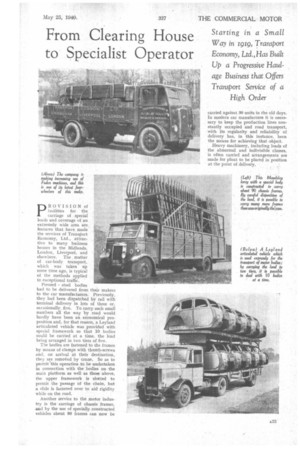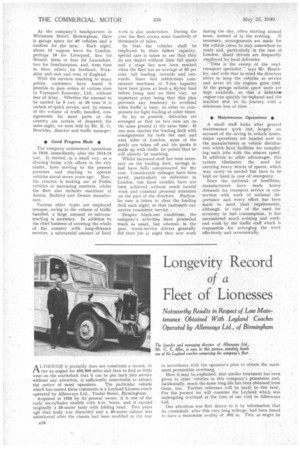From Clearing House to Specialist Operator
Page 25

Page 26

If you've noticed an error in this article please click here to report it so we can fix it.
Starting in a Small Way in IgIg, Transport Economy,Ltd.,Has Built Up a Progressive Haulage Business that Offers Transport Service of a High Order PROVISION of facilities for the carriage of special loads and coverage of an extremely wide area are. features that have made the services of Transport Economy, Ltd., attractive to many business houses in the Midlands, London, Liverpool, and elsewhere. The matter of car-body transport, which was taken up some time ago, is typical of the methods applied to exceptional traffic.
Pressed steel bodies had to be delivered from their makers to the car manufacturers. Previously, they had been dispatched by rail with terminal delivery in lots of three or, occasionally, five. To carry such small numbers all the way by road would hardly have been an economical proposition and, for that reason, a Leyland articulated vehicle was provided with special framework so that 10 bodies could be carried at a time, the load being arranged in two tiers of five.
The bodies are fastened to the frames by means of clamps with thumb-screws and, on arrival at their destination, they are remoffed by crane. So as to permit this operation to be undertaken in connection with the bodies on the main platform as well as those above, the upper framework is slotted to permit the passage of the chain, but a slide is fastened over to aid rigidity -while on the road.
Another service to the motor industry is the carriage of chassis frames, and by the use of specially constructed vehicles about 90 frames can now be carried against 30 units in the old days. In modern car manufacture it is necessary to keep the production lines constantly occupied and road transport, with its regularity and reliability of delivery has, in this instance, been the means for achieving that .object.
Heavy machinery, including loads of the abnormal and indivisible classes, is often carried and arrangements are made for plant to be placed in position at the point of delivery.
At the company's headquarters in Whitmore Street, Birmingham, there is garage. space for 40 vehicles and a
canteen for the men. Each night, about 15 wagons leave for London, perhaps 10 for Liverpool, five for Bristol, three or four for Lancashire, two for Southampton, and, from time to time, others for Scotland, Yorkshire and east and west of England. With the services touching so many points, customers have found it possible to pass orders of various sizes to Transport Economy, Ltd., without fear of delay. Whether the amount to be carried be 5 cwt. or 20 tons it is certain of quick service, and, by reason of the volume of traffic handled, consignments for most parts of the country are certain of despatch the same night, we were told by Mr. K. G. Bouckley, director and traffic manager.
• Good Progress Made •
• The company commenced operations in 1919, immediately after the 1914-18 war. It started, in a small way, as a clearing hoase with offices in the city centre, later moving to the present premises and starting to operate vehicles about seven years ago. Now, the concern is making use of Foden vehicles in increasing numbers, whilst the fleet also includes machines of Austin, Bedford -and Dennis manufac
ture. • Various other types are employed because, owing to the volume of traffic handled, a large amount of sub-contracting is necessary. In addition to the chief business of covering the whole of the country .with long-distance services, a substantial amount of local work is also undertaken. During the year the fleet covers some hundreds of thousands of miles.
So that the vehicles shall be employed to their fullest capacity, special care is taken to see that they do not depart without their full quota and a stage has now been reached when the fleet has an average of 93 per cent, full loading, inwards and outwards. Since fuel restrictions commenced machines of 7-ton capacity have been given at least a 6i-ton load before being sent on their way, an important point being that this plan prevents any tendency to overload when traffic is busy, in order to compensate for light loading at other times.
So far as possible, deliveries are arranged so that no two men are on the same ground at the same time. •If one man reaches the loading deck with consignments for both the east and west sides of London, some of the goods are taken off and his quota is made up with traffic for points that he will already be touching.
Whilst increased staff has been necessary on the loading deck, savings in fuel have fully compensated for the cost. Considerable mileages have been saved, particularly on deliveries in London, but these benefits have not been achieved without much careful work and constant personal attention on the part of the directors. Particular care is taken to clear the loading deck each night, so that customers can receive consistent service.
Despite black-out conditions, the company's activities have Proceeded much as usual, but whereas, in the past, trunk-service drivers generally did their job at night they now work
during the day, often starting around noon, instead of in the evening. If necessary, arrangements are made for the vehicle crews to stay somewhere en route and, particularly in the case of London, shunt drivers are frequently employed for local deliveries.
"Time is the enemy of the roadtransport specialist," says Mr. Bouckley, and with that in mind the directors strive to keep the vehicles in service and never let the engines grow cold. At the garage suitable spare units are kept available, so that a defective engine can quickly be'replaced and the machine sent on its journey with a minimum loss of time.
• Maintenance Operations •
A small staff looks after general maintenance work but, largely on account of the saying in vehicle hours, major operations are handed over to the manufacturers or vehicle distributors which have facilities for completingsuch jobs with the utmost speed. In addition--to other advantages, this system eliminates the need for carrying heavy stocks of spares, which may rarely be needed but have to be kept on hand in case of emergency.
Since the outbreak of hostilities, manufacturers have made heavy demands for transport service in con' nection with work of national importance and every effort has been made to meet their requirements, although, in view of the need for economy in fuel consumption, it has necessitated much evening and weekend work by the traffic staff which is responsible for arranging the work effectively and economically.




























































